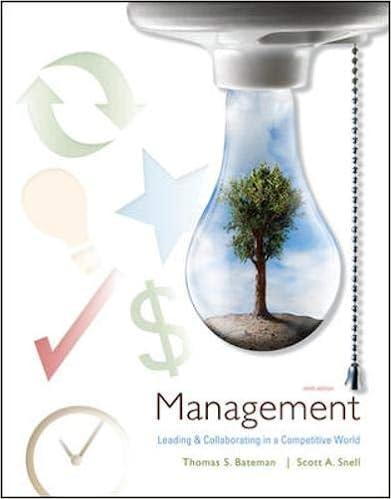Question
EXERCISE 1 This exercise is about offer and acceptance. John, a homeowner, answers the telephone and listens to a solicitor make a five-minute sales pitch
EXERCISE 1 This exercise is about offer and acceptance. John, a homeowner, answers the telephone and listens to a solicitor make a five-minute sales pitch for Weed Gardening Services. John responds, "No, thank you," and hangs up. Two days later, John returns home from work to find a crew gardening in his yard and a bill for $200 sitting on the porch. When John tells the Weed representative that he never asked for this service, Weed responds by saying, "It looks much better, doesn't it? You got the service, now pay for it." John agrees that the work was of good quality, but refuses to pay for it. He is later served with a summons to appear in magistrate court because of this dispute. How should the judge rule?
EXERCISE 2 This exercise is about offer and acceptance. Mike puts an ad in the newspaper stating that he wants to sell his truck for $500. James goes to Mike's home and tells him that he is interested in buying the truck. After looking at it, James hands Mike $500 in cash, which Mike puts in his pocket. Just then, Steve drives up and tells Mike that he'll give him $600 for the truck. Mike hands James back his $500 and sells the truck to Steve. James sues Mike for breach of contract
EXERCISE 3 This exercise is about breach of contract. Green Company has a contract with Red Company to buy 400 golf balls, to be delivered to Green Company on July 16. The contract states that "time is of the essence." On July 18, Red Company delivers the 400 golf balls to Green Company. Green Company refuses to accept the golf balls because of the delay and sues Red Company for breach of contract. How should the judge rule?
EXERCISE 4 This exercise is about damages for breach of contract. Jeff makes a contract with Acme Farms to buy 1000 apples for $200, which is the average price for apples at that time. The contract specifies that Jeff must have the apples by April 2 so that he can make his specialty apple pies to sell to Yummy Bakery. On March 15, Acme Farms informs Jeff that they will not be able to meet his order. On April 4, Jeff files suit against Acme Farms for breach of contract and wins the case. Jeff asks for consequential damages that will reimburse him for the amount of profit that he would have been paid by Yummy Bakery if he had been able to make his apple pies. Acme presents evidence proving that Jeff had not even tried to find substitute apples, even though he had sufficient time before his deadline and there were other farms nearby that could have supplied him with apples for the same $200 price.
EXERCISE 5 This exercise is about the parol evidence rule. In the same scenario, Jim now claims that before he signed the contract he and Diana agreed orally that at least half the comics would be Superman. Diana denies the conversation took place and argues that such evidence would violate the parol evidence rule. How should the judge rule?
Step by Step Solution
There are 3 Steps involved in it
Step: 1
Exercise 1 The judge should rule in favor of John Despite the work being completed John did not requ...
Get Instant Access to Expert-Tailored Solutions
See step-by-step solutions with expert insights and AI powered tools for academic success
Step: 2

Step: 3

Ace Your Homework with AI
Get the answers you need in no time with our AI-driven, step-by-step assistance
Get Started


